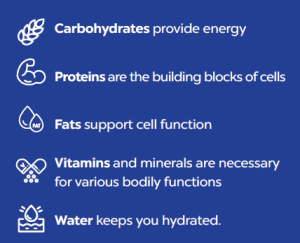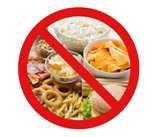In today’s fast-paced world, maintaining a healthy diet can be challenging. With the constant promotion of quick-fix diets and the temptation of fast food, it’s easy to stray from healthy eating habits. However, establishing a nutritious and balanced diet is crucial for our overall health and well-being. This article will guide you through the fundamentals of healthy eating habits in simple terms, ensuring that you can make informed choices for a healthier lifestyle.
Understanding the basics of healthy living:
Healthy eating is not about strict dietary limitations or depriving yourself of the foods you love. Instead, it’s about feeling good, having more energy, improving your health, and stabilizing your mood. To achieve this, you need to consume a variety of foods in the right proportions.

Balanced diet: A balanced diet provides your body with all the essential nutrients, including carbohydrates, proteins, fats, vitamins, and minerals. Each of these nutrients plays a specific role in maintaining good health.
Proportion Control: Overeating, even healthy foods, can lead to weight gain and other health issues. Proportion control is about eating the right amount of food, which varies depending on your age, sex, activity level, and overall health. One simple way to manage proportions is to fill half your plate with vegetables, a quarter with protein (like meat, beans, or tofu), and the remaining quarter with whole grains.
Variety is Key: No single food can provide all the nutrients your body needs. Eating a wide variety of foods ensures you get a good mix of vitamins, minerals, and other nutrients. One can aim to include a rainbow of fruits and vegetables in one’s diet, along with different types of proteins and grains.
 Healthy Eating Habits to Adopt: To develop healthy eating habits, you need to make small, manageable changes that can be maintained over time. Some simple habits can significant impact oyur health:
Healthy Eating Habits to Adopt: To develop healthy eating habits, you need to make small, manageable changes that can be maintained over time. Some simple habits can significant impact oyur health:
 Eating Regularly: Skipping meals, especially breakfast, can lead to overeating later in the day. Eating at regular intervals helps to keep your metabolism steady and prevents hunger pangs that lead to unhealthy snacking. Start your day with a nutritious breakfast, and aim for small, balanced meals every 3-4 hours.
Eating Regularly: Skipping meals, especially breakfast, can lead to overeating later in the day. Eating at regular intervals helps to keep your metabolism steady and prevents hunger pangs that lead to unhealthy snacking. Start your day with a nutritious breakfast, and aim for small, balanced meals every 3-4 hours.
 Include More Fruits and Vegetables: Fruits and vegetables are rich in vitamins, minerals, and fiber, all of which are essential for good health. Aim to fill half your plate with fruits and vegetables at every meal. Fresh, frozen, or canned (without added sugar or salt) options are all good choices.
Include More Fruits and Vegetables: Fruits and vegetables are rich in vitamins, minerals, and fiber, all of which are essential for good health. Aim to fill half your plate with fruits and vegetables at every meal. Fresh, frozen, or canned (without added sugar or salt) options are all good choices.
 Choose Whole Grains Over Refined Grains: Whole grains like brown rice, oats, and whole wheat bread are more nutritious than refined grains like white rice and white bread. Whole grains retain more fiber and nutrients, which help in digestion and keep you feeling fuller for longer.
Choose Whole Grains Over Refined Grains: Whole grains like brown rice, oats, and whole wheat bread are more nutritious than refined grains like white rice and white bread. Whole grains retain more fiber and nutrients, which help in digestion and keep you feeling fuller for longer.
 Limit Added Sugars and Salt: Excessive sugar and salt intake are linked to various health problems, including obesity, heart disease, and high blood pressure. Be mindful of hidden sugars in processed foods and beverages. Opt for naturally sweet foods like fruits and use herbs and spices to flavor your food instead of salt.
Limit Added Sugars and Salt: Excessive sugar and salt intake are linked to various health problems, including obesity, heart disease, and high blood pressure. Be mindful of hidden sugars in processed foods and beverages. Opt for naturally sweet foods like fruits and use herbs and spices to flavor your food instead of salt.
 Stay Hydrated: Water is essential for every function in your body. It aids digestion, regulates body temperature, and helps transfer of nutrients. Aim to drink at least 8 glasses of water a day. If plain water is not appealing, try adding a slice of lemon or cucumber for a refreshing twist.
Stay Hydrated: Water is essential for every function in your body. It aids digestion, regulates body temperature, and helps transfer of nutrients. Aim to drink at least 8 glasses of water a day. If plain water is not appealing, try adding a slice of lemon or cucumber for a refreshing twist.
 Mindful Eating: Mindful eating is about paying full attention to your food as you eat. It involves savoring the flavors, textures, and smells of your food and eating slowly to recognize when you’re full. This practice can help prevent overeating and increase your enjoyment of meals.
Mindful Eating: Mindful eating is about paying full attention to your food as you eat. It involves savoring the flavors, textures, and smells of your food and eating slowly to recognize when you’re full. This practice can help prevent overeating and increase your enjoyment of meals.
 Limited Processed Food: Processed foods are often high in unhealthy fats, sugars, and salt, and low in nutrients While processed foods are convenient, they should not be a staple of your diet. Instead, focus on whole, unprocessed foods like fruits, vegetables, lean proteins, and whole grains.
Limited Processed Food: Processed foods are often high in unhealthy fats, sugars, and salt, and low in nutrients While processed foods are convenient, they should not be a staple of your diet. Instead, focus on whole, unprocessed foods like fruits, vegetables, lean proteins, and whole grains.
 Healthy Snacking: Snacking doesn’t have to be unhealthy. Choose snacks that provide nutrition rather than empty calories. Examples include a piece of fruit, Examples include a piece of fruit, a handful of nuts, yogurt, or whole-grain crackers with hummus. Planning your snacks in advance can help you avoid unhealthy choices when hunger strikes.
Healthy Snacking: Snacking doesn’t have to be unhealthy. Choose snacks that provide nutrition rather than empty calories. Examples include a piece of fruit, Examples include a piece of fruit, a handful of nuts, yogurt, or whole-grain crackers with hummus. Planning your snacks in advance can help you avoid unhealthy choices when hunger strikes.
Overcoming Common Challenges:
Adopting healthy eating habits can be difficult, especially when faced with obstacles like busy schedules, limited food access, or emotional eating. Here are some strategies to overcome these challenges:

- Plan Ahead: Planning your meals and snacks ahead of time can save you from making unhealthy choices when you’re pressed for time. Prepare meals in bulk on the weekends or the night before to have healthy options ready when you need them.
- Healthy Substitutes: When cooking or baking, try to substitute unhealthy ingredients with healthier options. For example, use Greek yogurt instead of sour cream, whole wheat flour instead of white flour, or applesauce instead of butter.
- Manage Emotional Eating: Many people turn to food for comfort when they’re feeling stressed, lonely, or bored. This can lead to unhealthy eating habits. Instead of using food as a coping mechanism, find other ways to deal with your emotions, such as going for a walk, talking to a friend, get involved in any activity or practicing relaxation techniques.
- Manage Emotional Eating: Many people turn to food for comfort when they’re feeling stressed, lonely, or bored. This can lead to unhealthy eating habits. Instead of using food as a coping mechanism, find other ways to deal with your emotions, such as going for a walk, talking to a friend, get involved in any activity or practicing relaxation techniques.
Cultivating a Lasting and Balanced Approach to Eating:
Developing healthy eating habits isn’t about adhering to rigid diets or making sudden, drastic changes. It’s about establishing a sustainable, balanced way of eating that you can maintain over time. Here are some final tips:
- Listen to Your Body: Your body knows what it needs. Pay attention to hunger and fullness cues, and eat when you’re hungry and stop when you’re full. Don’t feel obligated to finish everything on your plate if you’re already satisfied.
- Enjoy Your Food: Eating should be a pleasurable experience. Take time to enjoy your meals, and don’t deprive yourself of the foods you love. Instead, find a balance where you can enjoy treats in moderation while still nourishing your body with healthy foods.
- Be Patient: Developing healthy eating habits is a journey, not a destination. It takes time to change your habits, and it’s okay to have setbacks along the way. The important thing is to stay committed and keep moving forward.







